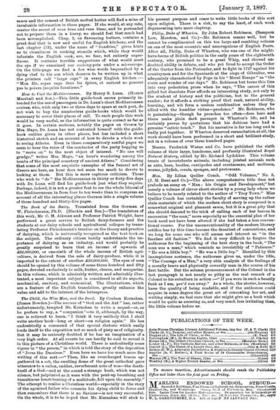Philip, Duke of Wharton. By John Robert Robinson. (Sampson Low,
Marston, and Co.)—Mr. Robinson means well, but he cannot be complimented on this too large and rambling volume on one of the most eccentric and unscrupulous of English Peers. After all, Philip, Duke of Wharton, who was one of the might- have-beens of British politics in the early years of the eighteenth century, who promised to be a great Whig, and showed un- doubted ability in debate, and who yet lived to accept the Order of the Garter from the Pretender, and to fight in 1727 against his countrymen and for the Spaniards at the siege of Gibraltar, was adequately characterised by Pope in his "Moral Essays" as "the scorn and wonder of our days." Mr. Robinson but turns this line into very pedestrian prose when he says, "The career of this gifted but dissolute Peer affords an interesting study, not only to the student of history and the politician, but to the general reader; for it affords a striking proof that rank, natural ability, learning, and wit form a useless combination unless they be allied with the humbler virtue—prudence." Mr. Robinson, who is painstaking—though he preaches too often—does here and there make plain dark passages in Wharton's life, and he certainly proves by quotations that his dubious hero had a genuine "satiric touch." But his narrative is far too long and is badly put together. If Wharton deserved resuscitation at all, the work should have been performed in a short and brilliant study, not in a volume of over three hundred pages.














































 Previous page
Previous page